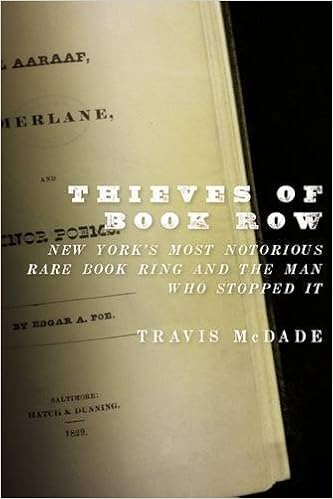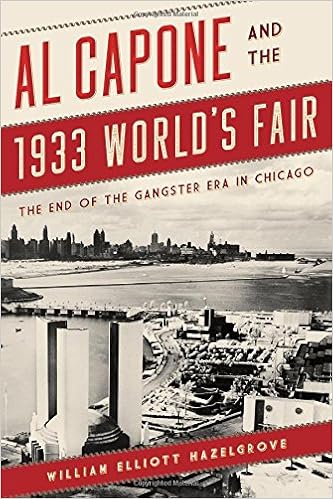Upcoming programs:
Sat 7/7 @ 2:30pm – Afternoon Matinee presents “Pillow Talk,”
(1959, not rated, 1h 42min)
Tue 7/17 @ 6:30pm – Documentaries After Dark presents “The Glamour & the Squalor,” (2015, not rated, 1h 20min)
Wed 7/18 @ 6:30pm – Arthouse Film series presents “Seven
Samurai,” (1954, not rated, 3h 27min)
Fri 7/20 @ 5pm – Ages 21+ only, Standing Room Only presents
Chopped: Vintage Recipe Edition, registration required to amandaw@bham.lib.al.us
Tue 7/24 @ 6:30pm – Birmingham Arts Journal new issue
release party
Tue 7/24 @ 6:30pm – Genre Reading Group Summer Salon
Discussion: Book of Choice
The Genre Reading Group met this week to discuss nonfiction on organized crime.

Thieves of Book Row: New York’s Most Notorious Rare Book Ring and the Man Who Stopped It by Travis McDade
No one had ever tried a caper like this before. The goods
were kept in a secure room under constant scrutiny, deep inside a crowded
building with guards at the exits. The team picked for the job included two old
hands known only as Paul and Swede, but all depended on a fresh face, a kid
from Pinetown, North Carolina. In the Depression, some fellows were willing to
try anything -- even a heist in the rare book room of the New York Public Library.
In Thieves of Book Row, Travis McDade tells the gripping tale of the worst book-theft ring in American history, and the intrepid detective who brought it down. Author of The Book Thief and a curator of rare books, McDade transforms painstaking research into a rich portrait of Manhattan's Book Row in the 1920s and '30s, where organized crime met America's cultural treasures in dark and crowded shops along gritty Fourth Avenue. Dealers such as Harry Gold, a tough native of the Lower East Side, became experts in recognizing the value of books and recruiting a pool of thieves to steal them -- many of them unemployed men who drifted up the Bowery or huddled around fires in Central Park's shantytowns. When Paul and Swede brought a new recruit into his shop, Gold trained him for the biggest score yet: a first edition of Edgar Allan Poe's Al Aaraaf, Tamerlane and Minor Poems. Gold's recruit cased the rare-book room for weeks, searching for a weakness. When he found one, he struck, leading to a breathtaking game of wits between Gold and NYPL special investigator G. William Bergquist. Both a fast-paced, true-life thriller, Thieves of Book Row provides a fascinating look at the history of crime and literary culture.
In Thieves of Book Row, Travis McDade tells the gripping tale of the worst book-theft ring in American history, and the intrepid detective who brought it down. Author of The Book Thief and a curator of rare books, McDade transforms painstaking research into a rich portrait of Manhattan's Book Row in the 1920s and '30s, where organized crime met America's cultural treasures in dark and crowded shops along gritty Fourth Avenue. Dealers such as Harry Gold, a tough native of the Lower East Side, became experts in recognizing the value of books and recruiting a pool of thieves to steal them -- many of them unemployed men who drifted up the Bowery or huddled around fires in Central Park's shantytowns. When Paul and Swede brought a new recruit into his shop, Gold trained him for the biggest score yet: a first edition of Edgar Allan Poe's Al Aaraaf, Tamerlane and Minor Poems. Gold's recruit cased the rare-book room for weeks, searching for a weakness. When he found one, he struck, leading to a breathtaking game of wits between Gold and NYPL special investigator G. William Bergquist. Both a fast-paced, true-life thriller, Thieves of Book Row provides a fascinating look at the history of crime and literary culture.

Al Capone and the 1933 World’s Fair: The End of the Gangster Era in Chicago by William Elliott Hazelgrove
William Hazelgrove provides the exciting and sprawling history behind the 1933
World's Fair, the last of the golden age. He reveals the story of the six
millionaire businessmen, dubbed The Secret Six, who beat Al Capone at his own
game, ending the gangster era as prohibition was repealed. The story of an intriguing
woman, Sally Rand, who embodied the World's Fair with her own rags to riches
story and brought sex into the open. The story of Rufus and Charles Dawes who
gave the fair a theme and then found financing in the worst economic times the
country had ever experienced. The story of the most corrupt mayor of Chicago,
William Thompson, who owed his election to Al Capone; and the mayor who
followed him, Anton Cermak, who was murdered months before the fair opened by
an assassin many said was hired by Al Capone. But most of all it’s the story about a city fighting for survival in the
darkest of times; and a shining light of hope called A Century of Progress.

Cocktail Noir: From Gangsters and Gin Joints to Gumshoes and Gimlets by Scott Deitche
Catering to lovers of the well-written word and the
well-mixed drink, Cocktail Noir is a lively look at the intertwining of alcohol
and the underworld―represented by authors of crime both true and fictional and
their glamorously disreputable characters, as well as by real life gangsters
who built Prohibition-era empires on bootlegged booze. It celebrates the potent
potables they imbibed and the watering holes they frequented, including some
bars that continue to provide a second home for crime writers. Highlighting the
favorite drinks of Noir scribes, the book includes recipes for cocktails such
as the Gimlet described in Raymond Chandler’s The Long Goodbye, the Mojito
Mulatta T.J. English drank while writing Havana Nocturne and the Dirty Martini
favored by mob chronicler Christian Cipollini.
Cocktail Noir also lets us in on
the drinking habits of notorious organized crime figures, revealing Al Capone’s
taste for Templeton Rye, Meyer Lansky’s preference for Dewar’s Scotch and
Gambino family hit man Charles Carneglia’s habit of guzzling Cutty Sark. With
black and white illustrations throughout, Cocktail Noir is as stylish and
irreverent as the drinks, often larger-than-life figures and culture it
explores.

Spam Nation: The Inside Story of Organized Cybercrime, From Global Epidemic to Your Front Door by Brian Krebs
In Spam Nation, investigative journalist and cybersecurity
expert Brian Krebs unmasks the criminal masterminds driving some of the biggest
spam and hacker operations targeting Americans and their bank accounts. Tracing
the rise, fall, and alarming resurrection of the digital mafia behind the two
largest spam pharmacies-and countless viruses, phishing, and spyware attacks-he
delivers the first definitive narrative of the global spam problem and its
threat to consumers everywhere.
Blending cutting-edge research, investigative reporting, and
firsthand interviews, this terrifying true story reveals how we unwittingly
invite these digital thieves into our lives every day. From unassuming computer
programmers right next door to digital mobsters like "Cosma"-who
unleashed a massive malware attack that has stolen thousands of Americans'
logins and passwords-Krebs uncovers the shocking lengths to which these people
will go to profit from our data and our wallets.
Not only are hundreds of thousands of Americans exposing
themselves to fraud and dangerously toxic products from rogue online
pharmacies, but even those who never open junk messages are at risk. As Krebs
notes, spammers can-and do-hack into accounts through these emails, harvest
personal information like usernames and passwords, and sell them on the digital
black market. The fallout from this global epidemic doesn't just cost consumers
and companies billions, it costs lives too.
Fast-paced and utterly gripping, Spam Nation ultimately
proposes concrete solutions for protecting ourselves online and stemming this
tidal wave of cybercrime-before it's too late.

Dillinger’s Wild Ride: The Year That Made America’s Public Enemy Number One by Elliott J. Gorn
In an era that witnessed the rise of celebrity outlaws like
Baby Face Nelson, Pretty Boy Floyd, and Bonnie and Clyde, John Dillinger was
the most famous and flamboyant of them all. Reports on the man and his
misdeeds--spiced with accounts of his swashbuckling bravado and cool
daring--provided an America worn down by the Great Depression with a salacious
mix of sex and violence that proved irresistible.
In Dillinger's Wild Ride, Elliott J. Gorn provides a riveting account of the year between 1933 and 1934, when the Dillinger gang pulled over a dozen bank jobs, and stole hundreds of thousands of dollars. A dozen men--police, FBI agents, gangsters, and civilians--lost their lives in the rampage, and American newspapers breathlessly followed every shooting and jail-break. As Dillinger's wild year unfolded, the tale grew larger and larger in newspapers and newsreels, and even today, Dillinger is the subject of pulp literature, serious poetry and fiction, and films, including a movie starring Johnny Depp. What is the power of his story? Why has it lingered so long? Who was John Dillinger?
Gorn illuminates the significance of Dillinger's tremendous fame and the
endurance of his legacy, arguing that he represented an American fascination
with primitive freedom against social convention. Dillinger's story has much to
tell us about our enduring fascination with outlaws, crime and violence, about
the complexity of our transition from rural to urban life, and about the
transformation of America during the Great Depression. Dillinger's Wild Ride is a compulsively readable story with an
unforgettable protagonist.

Gentlemen Bootleggers: The True Story of Templeton Rye,Prohibition, and a Small Town in Cahoots by Bryce T. Bauer
During Prohibition, while Al Capone was rising to worldwide
prominence as Public Enemy Number One, the townspeople of rural Templeton,
Iowa—population just 428—were busy with a bootlegging empire of their own. Led
by Joe Irlbeck, the whip-smart and gregarious son of a Bavarian immigrant, the
outfit of farmers, small merchants, and even the church monsignor worked
together to create a whiskey so excellent it was ordered by name:
"Templeton rye."
Just as Al Capone had Eliot Ness, Templeton’s bootleggers
had as their own enemy a respected Prohibition agent from the adjacent county
named Benjamin Franklin Wilson. Wilson was ardent in his fight against alcohol,
and he chased Irlbeck for over a decade. But Irlbeck was not Capone, and
Templeton would not be ruled by violence like Chicago.
Gentlemen Bootleggers tells a never-before-told tale of
ingenuity, bootstrapping, and perseverance in one small town, showcasing a
group of immigrants and first-generation Americans who embraced the ideals of
self-reliance, dynamism, and democratic justice. It relies on previously
classified Prohibition Bureau investigation files, federal court case files,
extensive newspaper archive research, and a recently disclosed interview with
kingpin Joe Irlbeck. Unlike other Prohibition-era tales of big-city gangsters,
it provides an important reminder that bootlegging wasn’t only about glory and
riches, but could be in the service of a higher goal: producing the best
whiskey money could buy.




No comments:
Post a Comment